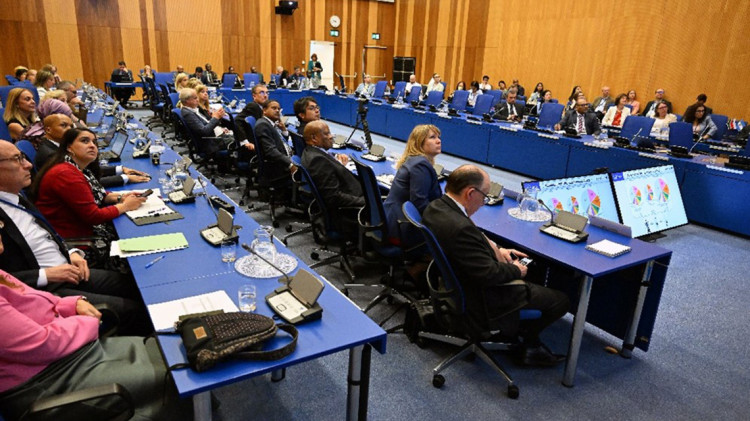Three medical institutes - including the first-ever from Latin America - have joined the IAEA's flagship cancer initiative as Rays of Hope Anchor Centres, bringing the current total to nine such centres around the globe. As knowledge and capacity building hubs for their respective regions, the Comisión Nacional de Energía Atómica (CNEA) in Argentina, the lnstitute of Oncology Ljubljana in Slovenia and the Nuclear Medicine Research Infrastructure (NuMeRI) facility at Steve Biko Academic Hospital in South Africa will help to advance the goal of cancer care for all by strengthening the radiation medicine capacities of their neighbouring countries.
Anchor Centres are cancer institutes with a demonstrated record of working with the IAEA; possessing deep technical expertise; long term commitment; and robust governance and medical infrastructure, among other criteria. They are central to the IAEA's Rays of Hope initiative, aimed at expanding access to cancer care to countries where it is needed most. These centres provide targeted support to neighbouring countries in key areas such as research, education, training, innovation and quality assurance.
During a ceremony held at IAEA headquarters in Vienna on 6 June, representatives signed agreements designating their respective cancer facilities as Anchor Centres for the next four years. IAEA Director General Rafael Mariano Grossi said: "These centres will enhance cancer care and innovation, bringing life-saving treatments to more communities."
Proud to announce 3 new @IAEAorg #RaysOfHope anchor centres: South Africa Steve Biko Academic Hospital, Slovenia Institute of Oncology Ljubljana & Argentina @CNEA_Arg. These centres will enhance cancer care and innovation, bringing life-saving treatments to more communities. pic.twitter.com/xW8CZh3AnV— Rafael MarianoGrossi (@rafaelmgrossi) June 6, 2024
"From Argentina, we just want to transmit the hope that we can make some difference", Luis Rovere, CNEA's Vice President said during the ceremony. Nine medical institutes from across Argentina have united to form a network which leverages their collective experience and expertise within diagnostic imaging, nuclear medicine, oncology, radiation therapy and proton therapy. All nine will work with the IAEA to implement activities in human health, education, training, radiology, radiotherapy and radiopharmacy. CNEA will also assist on the strategic planning, design and development of new radiotherapy and nuclear medicine-related projects in the region. The IAEA's support to Argentina - on the feasibility of adopting and implementing proton therapy as an advanced treatment procedure, for example - has already helped to enhance the country's cancer capabilities.
The Institute of Oncology Ljubljana will advance radiation medicine in Europe and Central Asia even further as the region's Anchor Centre. First established in 1937 as the Regional Institute for Research and Treatment of Neoplasms, the Institute of Oncology Ljubljana has previously participated in an IAEA coordinated research project on the detection and diagnosis of breast cancer; an IAEA evidence-based assessment of radiotherapy practices and utilization rates; as well as an IAEA clinical trial examining an advanced technique to treat advanced cases of health and neck cancers in low- and middle-income countries. The Institute has also co-authored scientific articles with the IAEA; hosted IAEA fellows, regional courses, and training workshops; and provided experts for IAEA quality audits and other human health activities. Under Rays of Hope, the Institute will build on its work with the Agency. "I really hope that Slovenia will be a good partner - a good Anchor Centre - in this important project," Andraž Jakelj, the Institute's Director General, said during the ceremony.

Attendees of the 6 June Anchor Centre signing ceremony. (Photo: D. Calma/IAEA)
Within Africa, the NuMeRI facility at Steve Biko Academic Hospital will support the establishment and upgrade of cancer centres across the continent within each country's respective capacities and infrastructure. For decades, the Steve Biko Academic Hospital has collaborated with the IAEA on clinical research, education, training, quality assurance activities and the development of professional networks. Its expanded role - both in biomedical research at the global level and in knowledge sharing at the regional level - has been supported by the Agency's capacity building efforts. As a Rays of Hope Anchor Centre, the hospital will enhance the radiation medicine capabilities of others by fostering multidisciplinary collaboration and advancing medical knowledge. "It is important to realise that no one fails alone [and that] no one succeeds alone as well," Mike Sathekge, Head of Nuclear Medicine Department at Steve Biko Academic Hospital, said during the ceremony.
"Together with the Rays of Hope Anchor Centres in Algeria, Morocco, Japan, Jordan, Pakistan, and Türkiye, the new centres in Argentina, Slovenia, and South Africa will help accelerate progress against cancer by leveraging innovation, best practice and collective experience to close global care gaps", said May Abdel-Wahab, Director of the IAEA Division of Human Health. "For patients around the world, these centres promise a future in which equitable cancer care for all becomes a reality."






